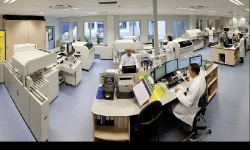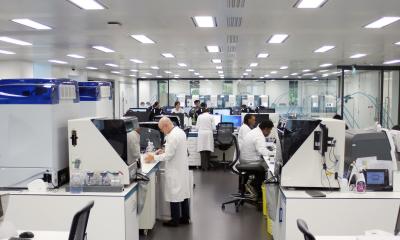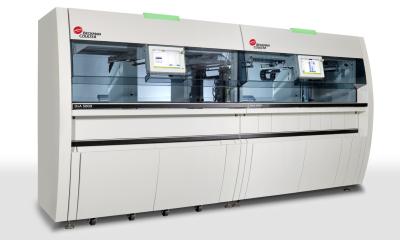Long-term managed lab automation
The University Medical Center in Utrecht (UMCU), The Netherlands, is in the process of creating a multidisciplinary centre of excellence, able to manage resources efficiently while delivering the highest level of patient care and clinical research.

As part of this, it fosters a collaborative and multidisciplinary approach across the staff, academic researchers and partners. An efficiently run laboratory service is integral to its success.
UMCU created one of Europe’s most innovative lab automation configurations when it became The Netherland’s first academic hospital to install a Beckman Coulter total automation solution. The laboratory has worked with the company since 2006 to consistently expand and enhance its service.
Laboratories from around Europe, including the NHS, have been visiting UMCU to see first-hand how Beckman Coulter operates as a long- term managed service partner. Like NHS labs, Utrecht required a partner that could help move the lab forward by delivering workflow improvements and innovative systems, within ever tighter budget controls.
The modern UMCU was formed in 1999, when the existing medical faculty merged with the Academic Hospital and the Wilhelmina Children’s Hospital.
Of its 1,000 beds, a fifth are exclusively for children. Areas of expertise in Utrecht include oncology, transplantation, diseases of the central nervous system, immunity and infectious diseases, vascular diseases, heart surgery as well as trauma.
‘Fast Service’ delivers greater efficiency
Demands on the lab have become increasingly diverse and complex. Workloads have increased exponentially with the central laboratory operating 24/7, with 200 full time equivalent staff. On average, it processes around 16,000 tests a day, 3.4 million a year, of which 1.5 million alone are for chemistry and immunoassay. One of the significant challenges to turnaround time has been the distance between wards in the different hospitals. Sample collection meant that they were coming into the lab in peaks, causing unpredictable bottlenecks.
Pre-automation Lean analysis also showed that performance was being affected by having too many suppliers offering different, incompatible analysers. This also reduced staff efficiency and created unnecessary training issues. The decision was taken to create the ‘Fast Service’ – integrating workflow for chemistry and immunochemistry as well as the pre-analytical phase for haematology, coagulation, blood gases and HbA1c testing.
Once the samples arrived in the lab, turnaround time (TAT) had consistently to be within one hour for both routine and stat samples. Samples coming into the lab from whatever location still had to meet the same TAT commitment. In addition, the solution had to be effective, without requiring extra staff or facilities for STAT samples. The labour-intensive pre-analytic phase, with its high error rate, also had to be resolved.
As lab manager Jan den Hartog explained: ‘There were some critical moments which required Beckman Coulter to show how well they could meet the high demands from UMCU. With their present solution, and its Dutch office support, the company has been able to prove it.’
To enhance the fast service, a ‘dedicated tube post’ service from Dutch Telecom was installed to improve the peaks of sample arrival. Instead of large batches arriving together, samples arrive every five minutes with a maximum of 20 tubes per carrier. Beckman Coulter’s automation solution had the flexibility to incorporate this third party supplier’s system without undermining promised TAT and throughput. The company worked with both the UMCU as well as Dutch Telecom to ensure this new ‘tube post’ integrated successfully.
Streamlined workflow
Utrecht chose Beckman Coulter’s Power Processor, with dynamic inlet and automated sample handling track to streamline workflow and increase capacity.
‘A track with integrated centrifuges reduces manual steps, making a guaranteed TAT much more of a reality. We now have the capacity to deliver our promised “Fast Service”, but more importantly the variation in TAT has dropped significantly,’ Jan den Hartog added. ‘We are achieving a faster and more consistent turnaround time, with our own metrics showing that we consistently hit a chemistry TAT of under one hour for at least 95% of test results.’
The track links two DxI 800 immunoassay systems (each handling up to 400 tests an hour) with two of the highest throughput clinical chemistry analysers available, forming an AU5811 configuration. Each handles up to 2,900 tests an hour. The AU5811 processes STAT and routine tests simultaneously. Three sample processing lanes are built into this AU system, with one designated a priority rack port. The installation of the Remisol Information System completed the package.
‘The AU5811 has enhanced reliability, with minimal downtime and maintenance,’ explained Mr den Hartog. ‘There is less need for manual dilution, fewer analyser flags and we need less sample volume to achieve accurate and reliable results. This is especially important for our extensive pediatric service.’
The 3,060-capacity refrigerated storage unit offers fast and automatic traceability for sample retrieval. Pre-analytic sample sorting is carried out by the high-speed AutoMate 2500, able to handle 1,200 samples per hour. From a single point of entry, the system manages all tubes, from sample receipt to archiving.
With a second sorter, the AutoMate 1250, the lab has additional aliquot capability for any special tests done elsewhere in the UMCU.
Partnership also includes the staff
‘Once members of staff have been trained and have adjusted to the new approach, they are able to trust a system which delivers results with minimal manual involvement,’ Jan den Hartog explained.
The members of staff are encouraged to play an active role in decisions. One example was the particular challenge presented by the large quantities of microtubes from the Children’s Hospital.
These are always difficult to handle, with a small sample amount and a tube that normally can neither be placed directly on the analysers nor on the track. A solution was needed to integrate microtubes into the new high-speed sample sorting and other automated solutions.
Once the staff understood how the new Beckman Coulter systems worked, they devised a ‘pedi-tube’ within a special 13 by 75 mm container that enables microtubes to be handled, throughout the whole process, as if they were standard tubes.
The Utrecht Medical Center is now in the third phase of its long term plan to create a multidisciplinary centre of excellence and, from the start, looked for a diagnostic partner that shared its values to improve patient outcomes.
As that long-term partner, Beckman Coulter’s aim is to continue moving the lab forward to achieve its objectives.
Jan den Hartog concluded: ‘This is a process of continuous improvement and, right from the start, the Beckman Coulter team were willing to adapt and be flexible, working with us to find the right long-term solutions.’
Profile:
Jan den Hartog is Laboratory Manager for the Department of Clinical Chemistry and Hematology at the University Medical Center Utrecht. He is an expert in lean six sigma thinking and led the project management team responsible for the design of the Fast Service and the total automation of the core lab.
04.09.2014





